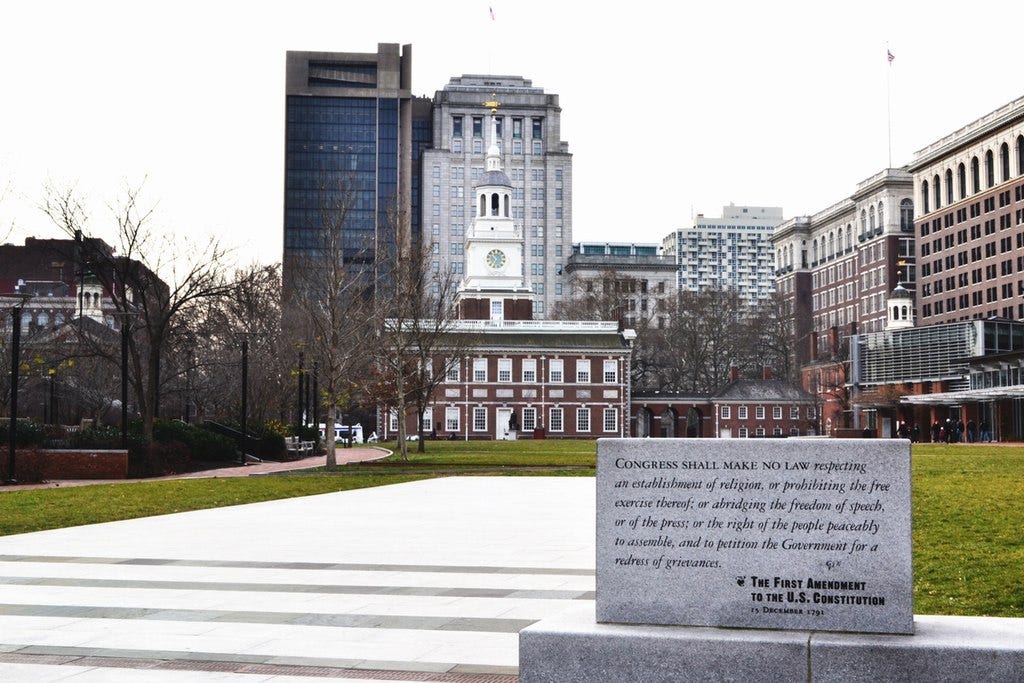The novel and daring American freedoms we take for granted
A quick look at the headlines and social media shows we are taking it all for granted.

This piece first appeared in my newspaper column for The Fayette Tribune (WV). Reprinted with permission after the print edition runs.
While doing some research and reading, I stumbled across a quote from eminent historian David McCullough that gave me pause. “Sadly, too many today take for granted public schools, freedom of religion, freedom of speech, equality before the law, forgetting that these were ever novel and daring ideas. Once.”
The politics of the moment is a constant exercise in placing and deflecting blame. This eternal thrust and parry of every news item, current event, election, and issue is the wave machine that keeps the news cycle churning.
Blame is a powerful thing. Blame is powerful enough to swing elections, change the direction of careers and countries, to affect history and legacy. The powerful, and wannabe powerful, spend a great deal of time and effort on blame and not being the object thereof.
Funny how you never hear a politician or content creator blaming good, old-fashioned complacency for too much. Not enough of a Big Bad for the algorithms to really get trending, probably. But the evidence all around us in America is that we have taken much for granted.
Complacency is the opposite of novel and daring ideas. George III was good and complacent with some disgruntled and put-upon overseas subjects until they decided to dissolve the political bands which had connected the American colonies to the British Crown. Taking up arms against the most powerful empire in the world was anything but complacent.
Most of those same leaders sat down after the fighting to figure out what a new American government would look like. The bitter fights over creating what we now know as our constitution, from drafting to ratification, took almost three years and put the fledgling country closer to coming apart than the British Army ever did. As part of that contentious ratification fight, the Bill of Rights was crafted to address concerns and was itself formally added to the United States Constitution as the first 10 amendments in 1791.
The First Amendment included no blame for the raucous context of its creation, but does contain five essential freedoms. “Congress shall make no law respecting an establishment of religion, or prohibiting the free exercise thereof; or abridging the freedom of speech, or of the press; or the right of the people peaceably to assemble, and to petition the Government for a redress of grievances.” For the 1780s, these were novel and daring ideas, taken from ancient Greek philosophy remixed with English jurisprudence and a radical idea that became the greatest example in all human history of a free people self-governing.
A quick look at the headlines and social media shows we are taking it all for granted. There are open calls for governmental power to not just protect, but enforce and impose, religious belief. The technological revolution of the internet, smart phones, and social media has folks debating what is protected speech and what isn’t in ways not even imaginable only a few years ago.
The free press that is essential to a free people struggles under the weight of business models, corporate and political interests, and a lack of faith in the fourth estate by the people. Protests that are peaceful go mostly ignored while riots, violence, destruction, and mayhem give the peaceful protests a bad name, drowning out any chance of a needed message getting across. A redress of grievances seems unattainable to folks who see the political class that is mostly above a legal system that feeds on the lowly to create more crime than it solves, and dispenses more injustice than the justice a citizenry rightly should expect.
But the blame for this sorry state of affairs is not in Washington, D.C. alone, or in state capitals and legislatures. The cycle is perpetuated by candidates of all stripes and beliefs blaming the current (officeholder) to become the next without all that much changing. The blame in a representative democracy cannot be at the reflection — the representatives — but must be rightly placed on what is being represented: We, the People.
The novel and daring approach would be to set aside complacency, take an honest look in the mirror that is our democratic republic and the elected officials we have stocked it with, and mutually pledge to each other our lives, our fortunes and our sacred honor to do something about it besides say bad things about our own electoral judgements on social media. But there is no honor in taking our freedoms and the country we have been handed by the generations before for granted.
Complacency has put the fortunes of our country at great peril. And the whole hot mess of the present can be traced back to taking for granted that our lives need to be pledged to each other in the common cause of a better country, in the actions of protecting the core freedoms afforded us on paper by living them out loud daily. If we do not, we might be the generation of which future historians say, “They had freedom of religion, freedom of speech, equality before the law in America. Once.”
That thought should be something we as Americans should not be able to live with.






Americans need only look at many other countries in the world to see that what they take for granted are things people in other nations only wish they could have.
Shared. Thank you for a very important reminder.